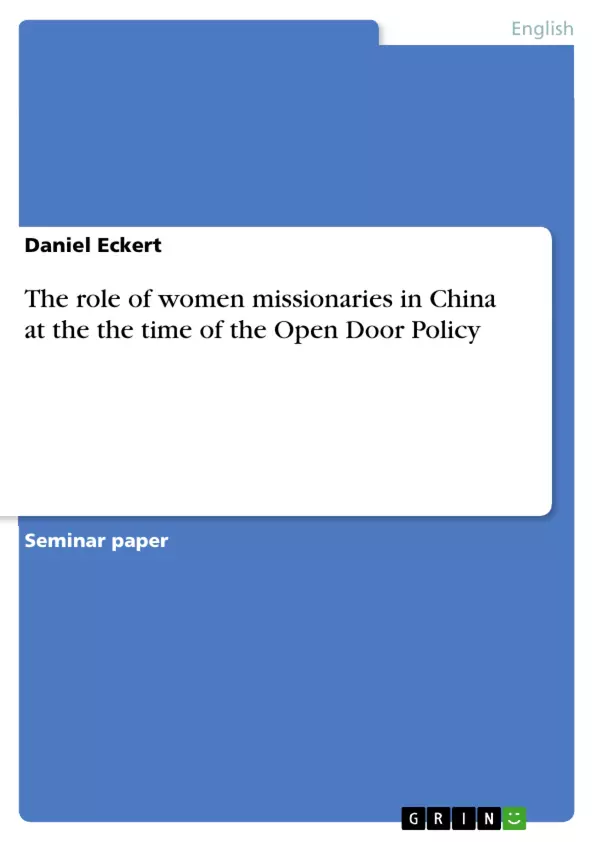By 1900, some one thousand American Protestant missionaries wanted to convert the Chinese population to Christianity, but were frustrated because of the growing Chinese hostility towards strangers and because of the cultural gap, which seemed to be too great to overcome. Missionaries also pointed out Chinese backwardness by stressing typical traditions and customs like the superiority of men over women. A political circumstance for the missionaries` work was the then ongoing decline of the Qing Dynasty, the defeat in the Sino-Japanese War at the end of the nineteenth century, and the growing influence of the imperial powers that followed.
To protect U.S. commerce in China and to preserve that nation`s independence, the then Secretary of State John Hay sent the imperial powers two notes which became known as the Open Door Policy. That policy is said to have been established because of the pressure of both economic and religious interest groups. But how did American missionaries interact with the Chinese people in daily life? How strong were the cultural ties between the two peoples? And finally, to what extend did the women missionaries help to westernize the Chinese value system? The question that overall arouses is about women missionaries, who turned out to be quite effective. In my eyes, their success is based on their female idiosyncracies, in connection with the circumstances under which they worked, namely the situation in America and the one in China.
The situation back in the US was rather lucky: In contrast to the difficulties the missionaries had to face in China, missionary women were supported by feminists back home: Female supporters caused interest by stressing the courage and heroism of missionary women. American women also played a role since “[…] societies gathered housewives` extra pennies to add women`s subsidies to the support of the foreign missionary movement.“ (Hunter, 445) Therefore the starting feminist women`s movement and the housewives` financial aid played a very important role for women missionaries in China.
Inhaltsverzeichnis (Table of Contents)
- The role of women missionaries in China at the time of the Open Door Policy
- Introduction
- The Situation in the United States
- The Situation in China
- The Success of Women Missionaries
- The Missionaries’ Attitude towards Commerce
- Women’s Support for Chinese Women’s Rights
- Cultural Imperialism
- Conclusion
Zielsetzung und Themenschwerpunkte (Objectives and Key Themes)
This paper examines the role of women missionaries in China at the time of the Open Door Policy, focusing on how their efforts contributed to the spread of Western influence and their impact on Chinese society.
- The influence of the Open Door Policy on missionary activities in China
- The cultural and societal challenges faced by missionaries in China
- The role of women missionaries in promoting Western ideals and values in China
- The impact of missionary work on Chinese women's rights and social status
- The ethical implications of missionary activities and their contribution to cultural imperialism
Zusammenfassung der Kapitel (Chapter Summaries)
- The Introduction provides an overview of the context of the Open Door Policy, the challenges faced by missionaries, and the focus on the role of women missionaries.
- The chapter “The Situation in the United States” discusses the support system for women missionaries, including the influence of the feminist movement and the financial contributions of American women.
- “The Situation in China” explores the challenges faced by missionaries in China, including cultural differences, nativism, and the threat from local officials.
- “The Success of Women Missionaries” analyzes the reasons for women’s success, including their unique approach to mission work, their understanding of Chinese women's situations, and their emphasis on personal relationships.
- “The Missionaries’ Attitude towards Commerce” examines the missionaries' stance on the introduction of Western goods and their efforts to promote ethical commerce.
- “Women’s Support for Chinese Women’s Rights” explores how women missionaries contributed to the promotion of women's rights in China, supporting Christian women and advocating for their independence.
- “Cultural Imperialism” discusses the inherent tensions between the missionaries' desire to spread Christianity and their contribution to cultural imperialism.
Schlüsselwörter (Keywords)
This work examines key topics such as the Open Door Policy, women missionaries, cultural imperialism, Chinese society, women's rights, and the influence of Western ideals on Chinese culture.
- Quote paper
- Daniel Eckert (Author), 2002, The role of women missionaries in China at the the time of the Open Door Policy, Munich, GRIN Verlag, https://www.grin.com/document/115469



